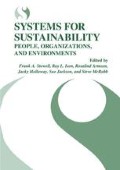Abstract
Improving the quality of products and services in an enterprise is the guide to superior competitiveness. Managers who carry out management functions which can affect the output quality of an enterprise (organisation) often rely on available data/information to make their decisions and to execute other business activities. Information Technology (IT) is capable of offering accurate and timely data/information if suitably integrated into an organisation. This work: (i) proposes a reinforced holistic approach based on’ systems thinking’ for developing an IT-based Information System (IS) and discusses its significance for quality improvement and business risks minimisation; (ii) further examines an industrially based project for the design and development of an IT-oriented information infrastructure system for risk assessment which employs a holistic approach. Proponents of continuous quality improvement, for example, Deming, Juran, Crosby and Taguchi (TMgt, 1990; Bergman and Klefsjo, 1994) have often referred to quality improvement as a way of managing an organisation (or a business) for growth and profitability as well as mutual benefits to the stakeholders. In the details following, emphasis is laid on a business-led strategy to the development of an information system. The objective of the strategy is to identify key parameters of a business and achieve adequate specifications before attempting to develop an IT-based application. The methodology of ‘action research’ (AR) is employed as a means for organisational investigation and evaluation of models. Details presented are based on findings from a current industrially oriented project on the tendering process in manufacturing management, in which the collaborative establishments are Renfrewshire Enterprise, Paisley and Compaq Computer Manufacturing Limited, Bishopton in the West of Scotland. The sections below discuss: (i) a reinforced holistic approach to the development of an IT-based IS; (ii) application of an AR-based method and preliminary results obtained.
Access this chapter
Tax calculation will be finalised at checkout
Purchases are for personal use only
Preview
Unable to display preview. Download preview PDF.
References
Akomode, O. J.; Lees, B.; Irgens, C., 1996, Applying Information Technology to Minimise Risks in Satisfying Organisational Needs, in, Proceedings of the 2 nd International Conference on Design of Information Infrastructure Systems for Manufacturing (DHSM), 15–19 September 1996, (eds), Goossenaerts, J; Kimura, F and Wortmann, H., Kaatsheuvel, The Netherlands, pp. 15-1-15-13.
Belavendram, N., 1995, “Quality by Design”, Prentice Hall.
Bergman, B. and Klefsjo, B., 1994, “QUALITY from Customer Needs to Customer Satisfaction”, McGraw-Hill.
Burrell, G. and Morgan, G., 1994, “Sociological Paradigms and Organisational Analysis”, Ashgate Publishing Ltd.
Checkland, P. B., 1981, “Systems Thinking, Systems Practice”, Chichester; Wiley.
Checkland, P. B. and Scholes, J., 1990, “Soft Systems Methodology In Action”, Chichester; John Wiley and Sons.
Feigenbaum, E. A., 1984, The Applied Side, in, Intelligent Systems-The Unprecedented Opportunity, (eds), Hayes, J. E. and Michie, D., Ellis Horwood, Chichester, pp.37–55.
Gammack, J. G. and Young, R. M., 1985, Psychological Techniques For Eliciting Expert Knowledge, in, Research and Development In Expert Systems, (ed.), Bramer, M. A., Cambridge University Press, pp. 105–112.
Huit, M. and Lennung, S., 1980, Towards a Definition of Action Research; A Note and Bibliography, Journal of Management Studies, Vol.17, pp.241–250.
Lewin, K., 1946, Action Research and Minority Problems. Journal of Social Issues, Vol.2, pp.34–46.
Neale, I. M., 1988, “First Generation Expert Systems: a review of knowledge acquisition methodologies”, The Knowledge Engineering Review, Vol.3, Part 2, pp. 105–145.
Parnaby, J., Nov. 1995, Systems Engineering for better engineering. IEE Review, pp.233-235.
Stowell, F. A.; West, D. and Fluck, M., 1991, The Appreciative Inquiry Method: an approach to knowledge elicitation as an inquiry system, Systemist, Vol. 13, No.4, pp. 154–65.
Susman, G. I. and Evered, R. D., Dec. 1978, An Assessment of the Scientific Merits of Action Research. Administrative Science Quarterly, Vol. 23, pp.582–603.
Traffic Management (TMgt), July 1990, The gurus of Quality, Comments to Quality, Vol. 29, pp.34–9.
West, D., 1995, The Appreciative Inquiry Method: A Systemic Approach to Information Systems Requirements Analysis, in, Information Systems Provision: The Contribution of Soft Systems Methodology, (ed.), Stowell, F. A., McGraw-Hill.
Winograd, T. and Flores, F., 1990, “Understanding Computers and Cognition: a new foundation for design”, Addison-Wesley.
Author information
Authors and Affiliations
Editor information
Editors and Affiliations
Rights and permissions
Copyright information
© 1997 Springer Science+Business Media New York
About this chapter
Cite this chapter
Akomode, O.J. (1997). Improving Output Quality and Minimising Business Risks with a Holistic Approach to Organisational Information Systems Development. In: Stowell, F.A., Ison, R.L., Armson, R., Holloway, J., Jackson, S., McRobb, S. (eds) Systems for Sustainability. Springer, Boston, MA. https://doi.org/10.1007/978-1-4899-0265-8_87
Download citation
DOI: https://doi.org/10.1007/978-1-4899-0265-8_87
Publisher Name: Springer, Boston, MA
Print ISBN: 978-1-4899-0267-2
Online ISBN: 978-1-4899-0265-8
eBook Packages: Springer Book Archive

